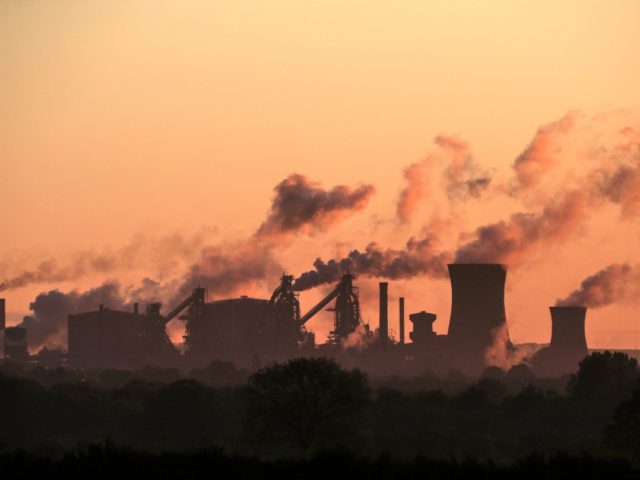The Jingye Group, a company with ties to the Chinese Communist Party (CCP), has agreed in principle to purchase British Steel for an estimated 70 million pounds ($90m).
The acquisition deal could save up to 4,000 jobs in the UK, as British Steel has been propped up by the government since it went into liquidation in May. The Associated Press reports the sale will include the steelworks at Scunthorpe, U.K. mills and shares of FN Steel BV, British Steel France Rail SAS and TSP Engineering and the Redcar Bulk Terminal.
British Steel accounts for one-third of steel production in the United Kingdom, Gareth Stace, director-general of industry lobby group UK Steel, told BBC Radio 4.
Stace went on to speculate that the purchase could be driven by a desire to gain a foothold in the UK, as well as the fact that: “British Steel makes rail, high-quality rail and heavy sections, ie girders, which Jingye doesn’t make.”
According to the company’s website, The Jingye Group has 23,500 employees has and has 39 billion yuan (£4.4bn) in registered assets. The company focusses of the production of steel and iron but also works in the hotel, tourism and real estate industries.
Chinese Communists Infiltrate British Universities, Confiscating Papers and Cancelling Events https://t.co/apQaws9ZS9
— Breitbart London (@BreitbartLondon) November 6, 2019
Just how connected the company is to the Chinese government is not fully known, however, the company’s site says that the founder and chairman of the Jingye Group, Li Ganpo, a Communist Party member, was a representative of the 11th National People’s Congress, the top legislative branch of the Chinese Communist Party.
In China, the line between public and private industry is often blurred, particularly when it comes to large scale investments, like Jingye Group’s plan to buy British Steel. Indeed, only individuals in good standing with the Communist Party are allowed to run companies in China and must, by law, cooperate with the Chinese military.
These matters of serious concern have impacted other large deals between Chinese and Western business in strategic industries, as governments have reacted to businesses allegedly indirectly controlled by the Chinese state gaining access to major infrastructure and communications systems.
Writing in The Guardian earlier this year, Richard McGregor, the former bureau chief in Beijing for the Financial Times, quoted one analyst, who said: “Chinese domestic laws and administrative guidelines, as well as unspoken regulations and internal party committees, make it quite difficult to distinguish between what is private and what is state-owned.”
China has long been accused of “dumping” steel on the world market, by subsidising domestic steel industries and exporting steel at “at below production costs”. The UK estimates that Chinese producers actually lose $34 per ton of steel produced.
Chinese dumping led the Trump administration to place a 25 per cent tariff on steel and aluminium from China, a move that has led to an increase in manufacturing jobs, particularly in communities that had been negatively impacted by decades of free trade.
Decoupling: China-U.S. Trade Declines by $67 Billion https://t.co/8L4zkXKqAz via @BreitbartNews
— John Carney (@carney) November 5, 2019
Some have tied Jingye Group’s acquisition of British Steel to the refusal of the government under David Cameron to protect the United Kingdom’s steel industry from Chinese dumping.
In 2016, the European Steel Association (Eurofer) accused the Cameron government of acting as a ‘ringleader’ in blocking attempts to regulate imports of cheap Chinese steel into the European Union.
A Eurofer spokesman said at the time: “The fact that the UK continues to block it means that when the government says it’s doing everything it can to save the steel industry in the UK and also in Europe, it’s not. It’s not true.”
The deal to purchase British Steel has also come under fire from Matthew Bryza, a former United States ambassador. Writing in the Financial Times, he said that in the context of the ongoing trade war between America and China: “This is neither the time nor space to antagonise the US by entering the embrace of Beijing.”
“The saviour of British Steel must be a credible investor with a long-term view and the knowhow to manage and modernise an industry that can — and should! — compete on the world stage. Jingye lacks this credibility” he added.
The acquisition of British Steel by the Jingye Group needs to be ratified by the government, The Times reports that the deal could be signed off as soon as this week.
Tesla reportedly plans to increase its investment in the Chinese market despite the ongoing trade war between China and the United States. According to one Chinese business professor, “Tesla can’t leave China. Otherwise, it will definitely die.” https://t.co/WbCqCEiIIW
— Breitbart News (@BreitbartNews) November 8, 2019

COMMENTS
Please let us know if you're having issues with commenting.